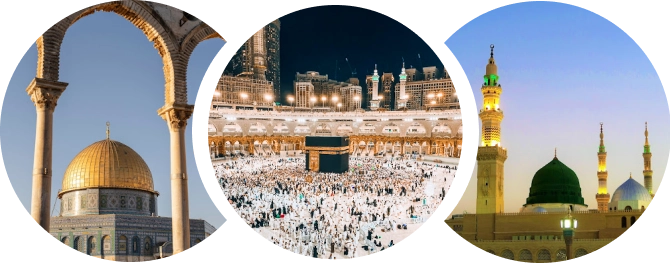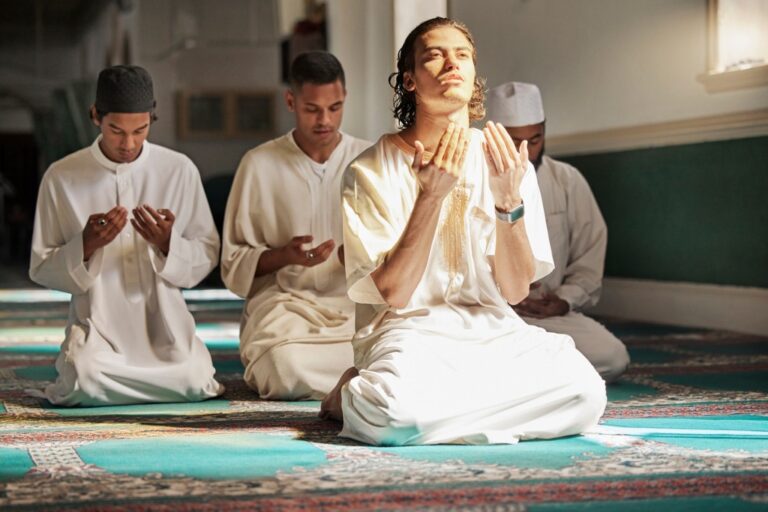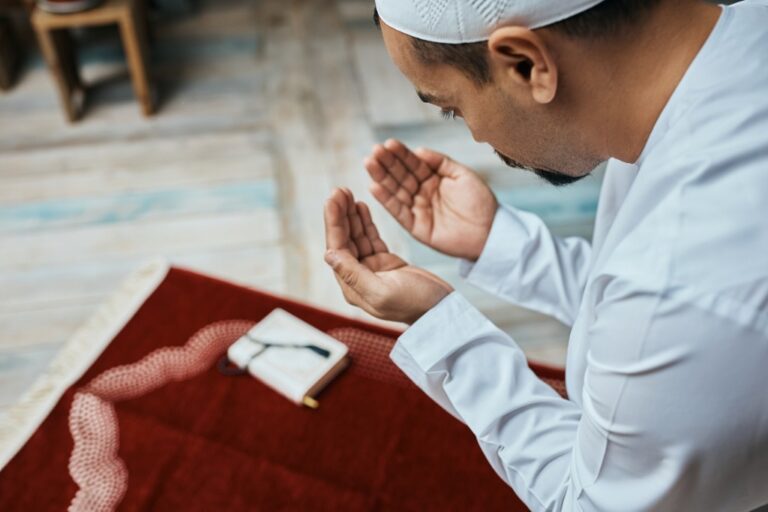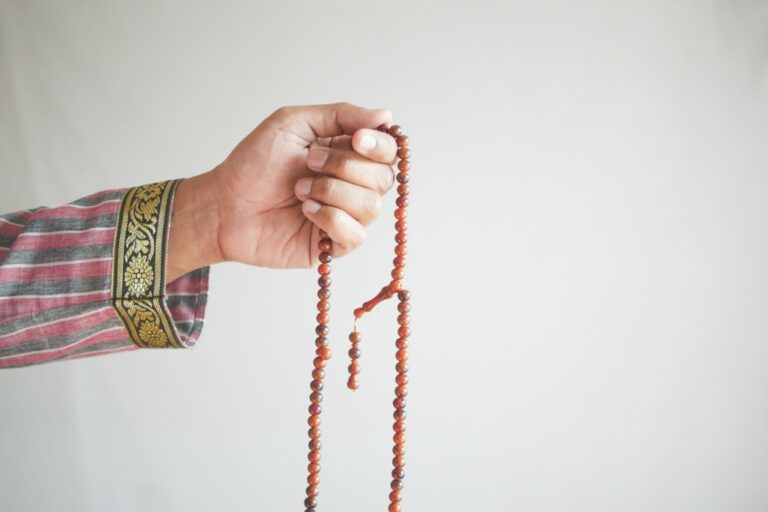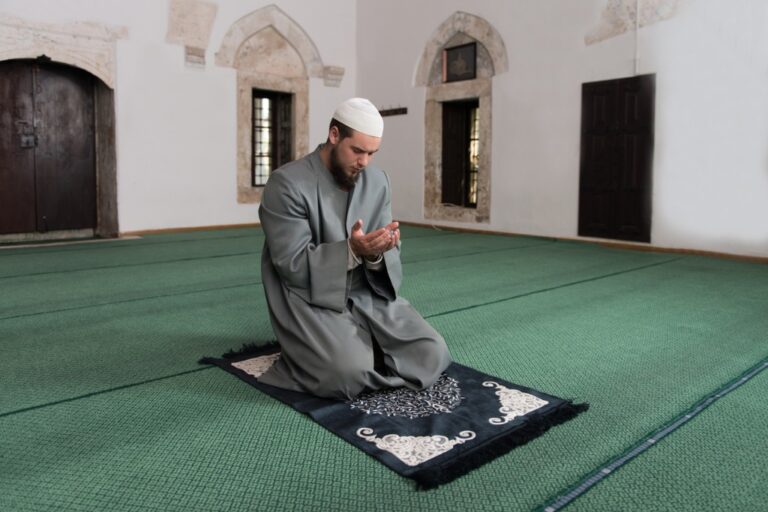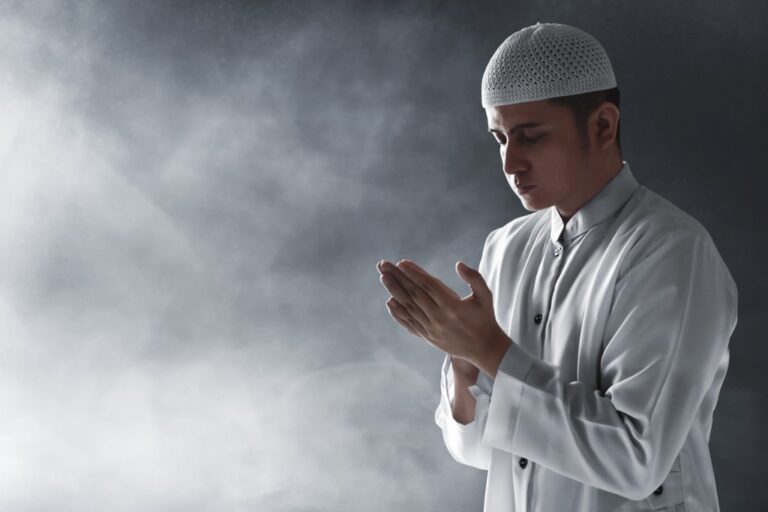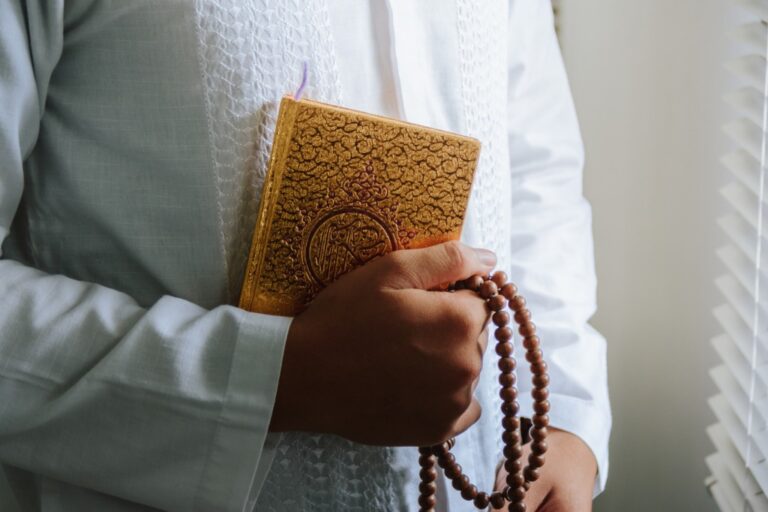Qibla in Islamic Worship: Understanding the Spiritual Importance of Facing the Qibla in Prayers (Salat)
Do you want to know why Muslims pray in a specific direction known as the Qibla? This distinctive feature of Islamic worship has profound spiritual and historical significance.
In this article, we’ll go over the rich history of the Qibla, its significance in fostering global Muslim unity, and how it improves your connection with Allah SWT during prayers. Qibla is more than just a physical orientation – it’s a path to devotion and divine connection!
Understanding the Concept of Qibla in Islam
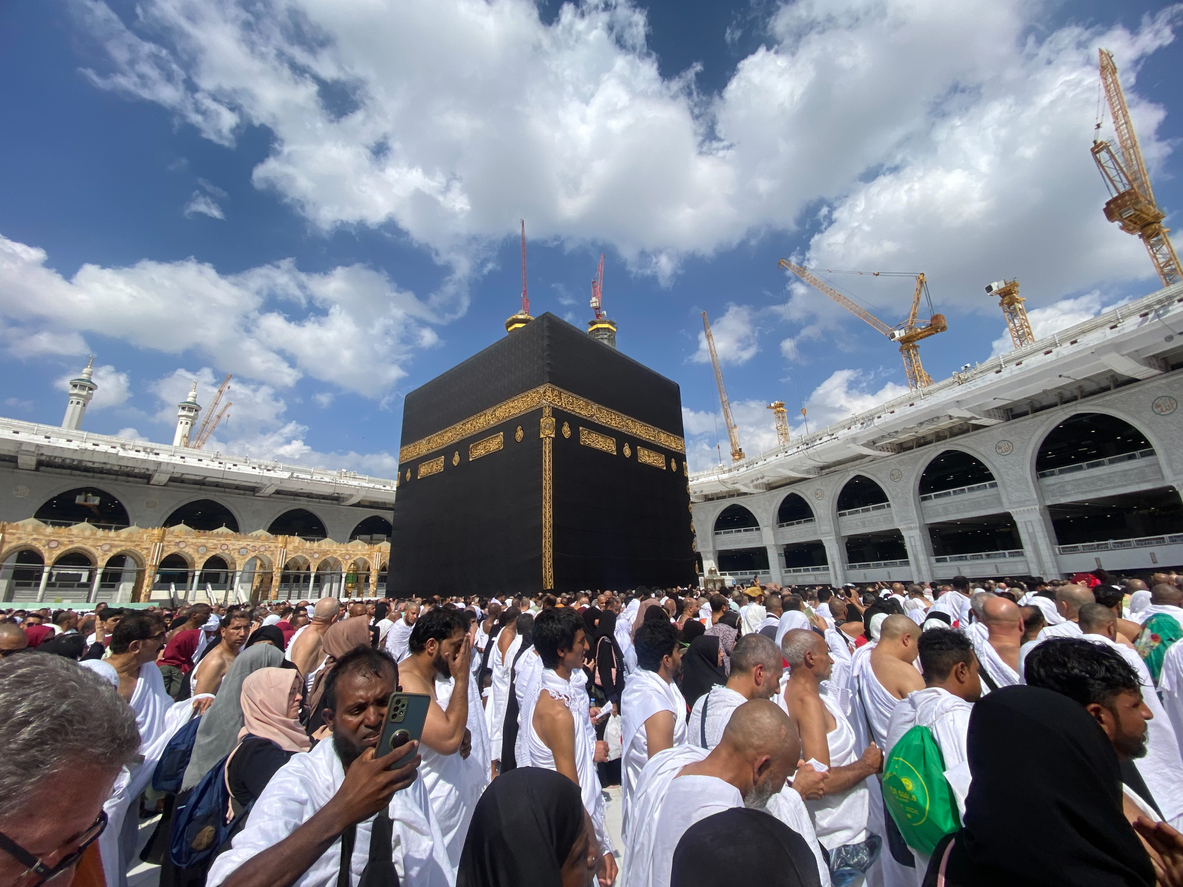

In Islam, “Qibla” refers to a spiritual compass or the direction Muslims face during their prayers. It is more than just a point on a map; it represents unity among worshippers and reflects fundamental Islamic teachings on monotheism and submission.
The Ka’ba, located in Mecca, Saudi Arabia, is the Qibla for all Muslims worldwide. This one-of-a-kind directive fosters a sense of community among believers regardless of geographical location.
It is important to note, however, that facing the Qibla does not imply that Allah SWT is limited to a specific location or direction. According to the Quran, He encompasses all directions and is not limited by space constraints.
وَلِلَّهِ الْمَشْرِقُ وَالْمَغْرِبُ ۚ فَأَيْنَمَا تُوَلُّوا فَثَمَّ وَجْهُ اللَّهِ ۚ إِنَّ اللَّهَ وَاسِعٌ عَلِيمٌ
And to Allah belongs the east and the west. So wherever you [might] turn, there is the Face of Allah. Indeed, Allah is all-Encompassing and Knowing. (Al baqarah: 115)
The establishment of the Qibla satisfies human needs for physical reference points and improves concentration during prayer.
Muslims who face the Ka’ba, as required by Islamic law, recognize Allah SWT’s presence beyond all boundaries, deepening their devotion and enriching their spiritual experience.
The Historical Significance of Qibla
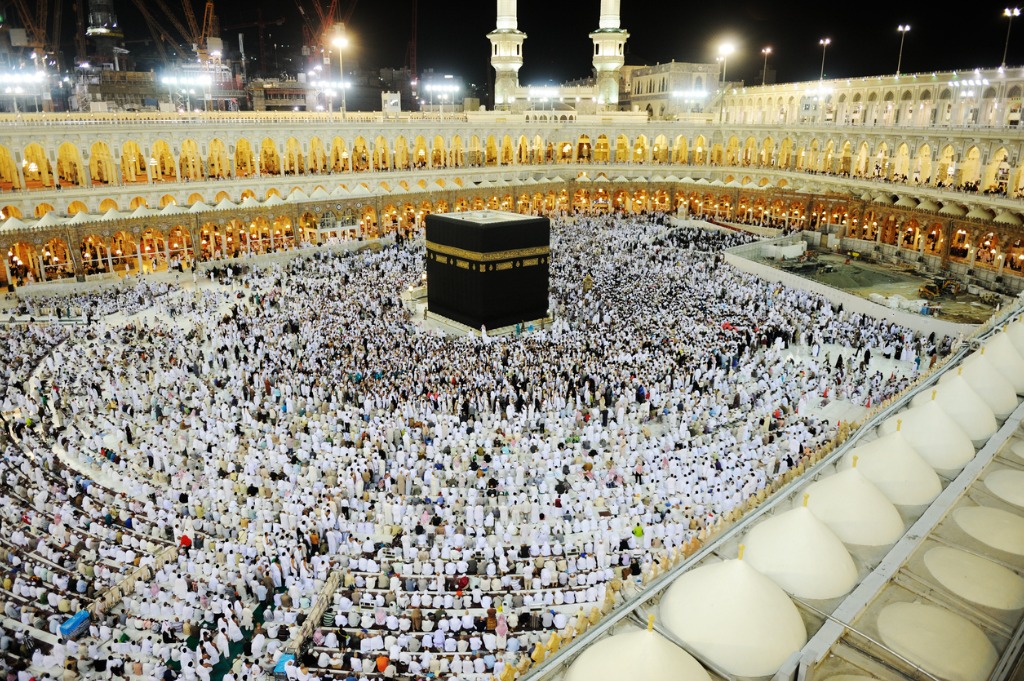

The historical significance of Qibla stems from Prophet Ibrahim PBUH and the shift in direction from the previous Qibla to Mecca.
The Previous Qibla
Muslims did not pray facing the Kaaba in Mecca in the early days of Islam. Instead, they focused their prayers on Al-Aqsa Mosque in Jerusalem, a holy site revered by all Abrahamic religions.
Following his miraculous journey to Al-Aqsa during Isra and Mi’raj – a significant event in Islamic history – Prophet Muhammad (PBUH) established this initial Qibla.
According to history, this was the Qibla until about 17 months after Hijrah (the migration of Prophet Muhammad PBUH and his companions from Mecca to Medina).
The shift from Jerusalem to the Kaaba (Mecca) marked an important turning point in Muslim identity and solidarity, which resonates with Muslims worldwide today.
Change in Qibla: A Story of Love and Faith
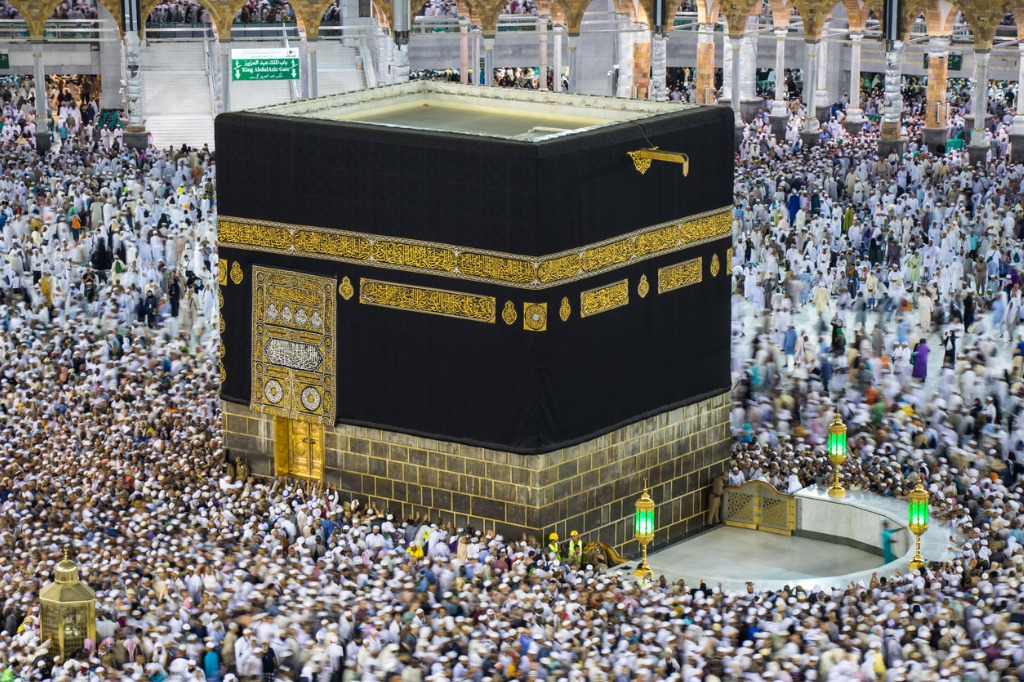

The change of Qibla is a significant event in the history of Islam. It demonstrates how much Muslims adore and worship Allah SWT. It is a meaningful story that reflects Muslims’ deep devotion and loyalty to their divine God, not just a religious change.
Allah SWT ordained this shift from Jerusalem to Mecca in Surah Baqarah as a compliance test for the believers.
True followers did not hesitate or question, but immediately accepted this new directive, demonstrating their boundless loyalty and unwavering faith.
قَدۡ نَرَىٰ تَقَلُّبَ وَجۡهِكَ فِي ٱلسَّمَآءِۖ فَلَنُوَلِّيَنَّكَ قِبۡلَةٗ تَرۡضَىٰهَاۚ فَوَلِّ وَجۡهَكَ شَطۡرَٱلۡمَسۡجِدِ ٱلۡحَرَامِۚ
We have certainly seen the turning of your face, [O Muhammad], toward heaven, and We will surely turn you to a qiblah with which you will be pleased. So turn your face toward al-Masjid al-Haram. (2:144)
They realized that pleasing Prophet Muhammad (PBUH) and serving Allah SWT came first. As a result, they immediately shifted their orientation during prayers, physically aligning with the Kaaba while spiritually edging closer to monotheism’s heartland.
This case demonstrated unequivocally that sincerity of intention carries more weight than mere ritualistic practices among Muslim devotees worldwide.
The Importance of Facing the Qibla in Prayers
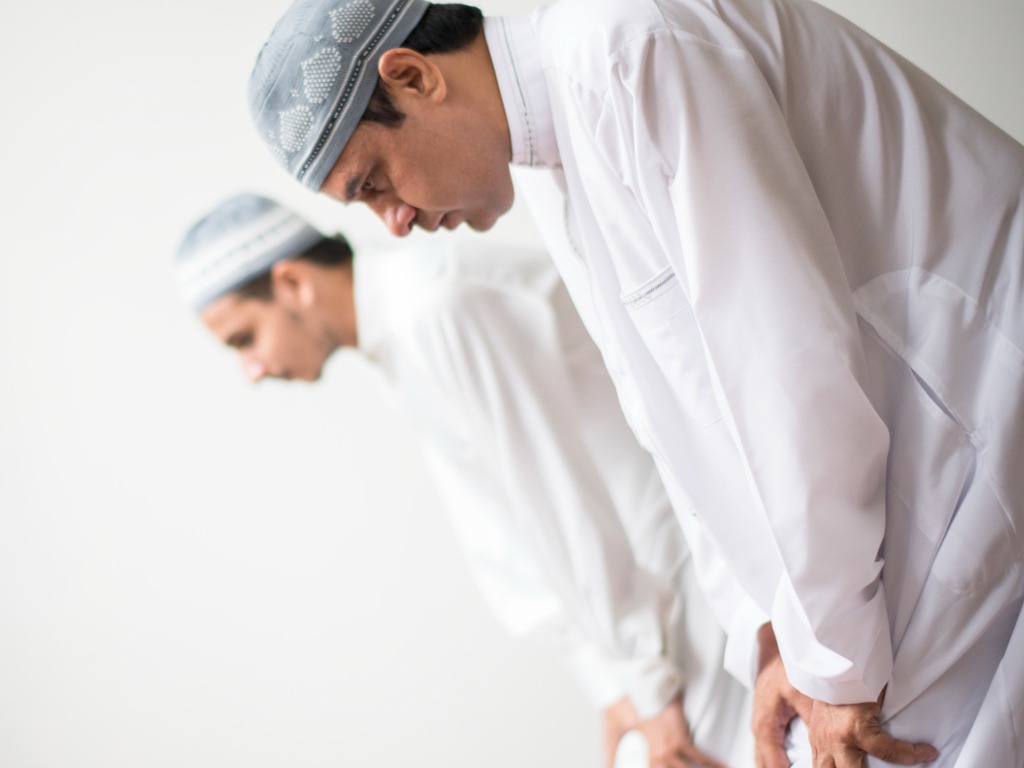

In prayer, facing the Qibla tests one’s obedience and strengthens their spiritual connection with Allah SWT.
Test of Obedience
This act also serves as a reminder to them that true worship necessitates discipline and adherence to Allah SWT’s instructions, which contributes to individuals’ overall spiritual growth and development.
Spiritual Connection
Facing the Qibla during prayers creates a strong spiritual bond between the worshipper and Allah SWT. It represents devotion and obedience to the divine commandments in physical form.
When Muslims face the Qibla, they are symbolically turning their hearts towards Mecca, where the Kaaba is located. While praying, this action allows Muslims to concentrate and have a more meaningful spiritual experience.
Furthermore, regardless of where they live or their cultural backgrounds, this common practice among Muslims worldwide promotes unity and togetherness within the Ummah (community).
The Kaaba and its Significance in Islamic Worship
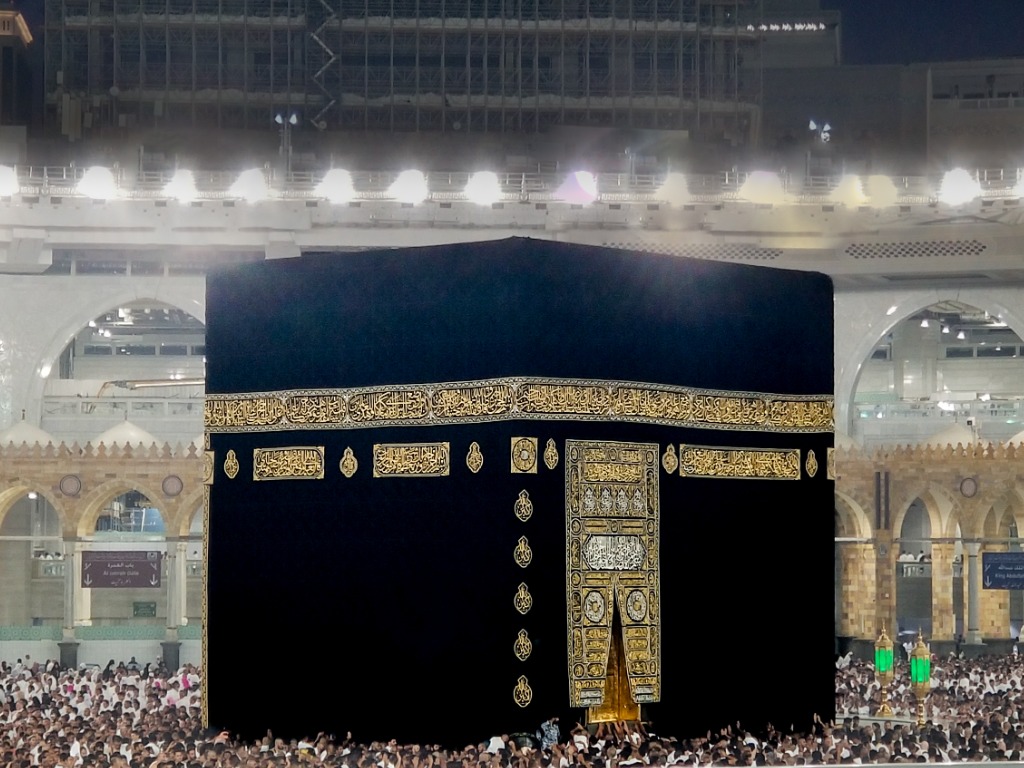

In Islamic worship, the Kaaba is significant, serving as a sacred focal point for Muslims to direct their prayers and connect with Allah SWT.
Why is the Kaaba important to Muslims?
Kaaba is the holiest site in Islam. It is the direction in which all Muslims pray, representing their unity and oneness in worshiping Allah SWT.
The Kaaba physically represents Allah SWT’s residence on Earth, reminding believers of His all-powerful presence.
It is a sacred symbol of Muslim faith and devotion due to its spiritual significance and central role in Islamic rituals such as the Hajj and Umrah.
Why was the Kaaba Built?
The Kaaba is rich in historical and spiritual significance. It was constructed by the Prophet Adam and later raised by the Prophets Ibrahim (Abraham) and Ismail (Ishmael).
According to Islamic tradition, it was built as a place dedicated to worshiping one God – Allah SWT. This act marked the beginning of monotheism, in which people were encouraged to abandon idol worship and turn solely to Allah SWT.
The building of the Kaaba represented a physical manifestation of this newfound belief in one God and served as a focal point for believers to gather for prayers.
Millions of Muslims visit Mecca each year to perform Hajj or Umrah and to circumambulate this holy structure in reverence.
Kaabah is Below Bait’al Mamoor
Baitul Ma’mur is a place beyond this world, situated in the highest (seventh) heaven. In many ways, the Kaaba and Baitul Ma’mur are similar. In a nutshell, Bait-ul-Ma’mur is the Kaaba for angels.
Surprisingly, Baitul Ma’mur is situated directly above the Kaaba. It was witnessed by Prophet Muhammad PBUH during his Isra Wal Mi’raj journey:
“…I found Ibrahim (Abraham peace be upon him) reclining against the Bait-ul-Ma’mur and there enter into it seventy thousand angels every day, never to visit (this place) again…” Sahih Muslim 162a
Every day, seventy thousand angels enter there, and due to the large number of angels, they never return. SubhanAllah!
The Profound Importance of Qibla in Islamic Worship
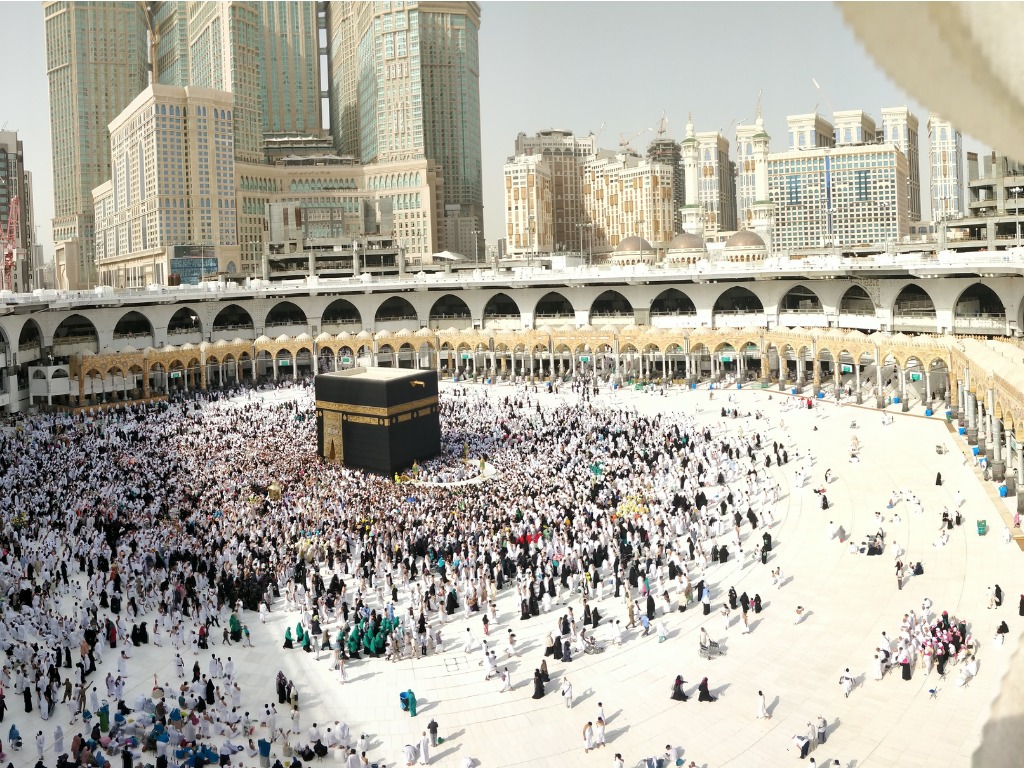

Facing the Qibla during prayers strengthens Muslim unity while deepening devotion and faith.
Enhancing Unity among Muslims
Facing the Qibla during prayers is essential to fostering Muslim unity. Muslims worldwide face the same direction when they pray, symbolizing their shared faith and commitment to Islam, regardless of their geographical locations.
It reinforces their sense of belonging to a larger community united by a common spiritual journey. This practice not only promotes unity, but also strengthens personal and collective bonds among individuals, fostering a sense of interconnectedness among Muslims.
Deepening Devotion and Faith
During prayers, facing the Qibla not only establishes a physical connection with Allah SWT, but also deepens one’s devotion and faith. When a Muslim turns their gaze to the Qibla, they are reminded of the importance and purpose of their worship.
This act promotes discipline and focus, allowing individuals to fully immerse themselves in their prayers. Muslims can strengthen their spirituality and develop a deeper bond with Allah SWT by facing the Qibla consistently.
This practice serves as a constant reminder of their commitment to following Islamic teachings. It strengthens their resolve to worship only Allah SWT. Muslims can strengthen their devotion and faith in every prayer they do by performing this simple yet profound act.
Conclusion
Qibla is significant in Islamic worship, representing unity, devotion, and a connection to Allah SWT. During prayers, facing the Qibla enhances the spiritual experience, and fosters a sense of belonging among Muslims all over the world.
While Allah SWT is not bound by space, praying towards the Qibla serves as a physical reference point that aids concentration and deepens one’s faith. The Qibla symbolizes reverence for all believers, transcending geographical boundaries and demonstrating Islam’s universal nature.
FAQs
1. What is the Qibla, and why is it significant in Islamic worship?
The Qibla is the direction Muslims face during daily prayers, specifically towards Mecca and the Kaaba. It has great spiritual significance because it represents unity and connects Muslims worldwide, regardless of geography.
2. How do Muslims determine the direction of the Qibla when praying?
Muslims can determine the Qibla direction using a compass or online tools (www.prayertimes.org) that provide accurate calculations based on their current location. Mosques also have indicators pointing to the Kaaba, such as mihrabs.
3. Is facing the Qibla necessary for prayers to be valid?
According to Islamic teachings, facing the Qibla is a necessary requirement for Muslim prayers to be valid. It represents humility, submission to Allah SWT, and alignment with the universal unity of believers worshiping together. However, if a Muslim does not know where the Qibla is, and prays in the wrong direction unknowingly, his prayers are valid.
4. What if a Muslim finds it difficult to physically face towards the Qibla during prayer?
If a Muslim faces physical challenges or circumstances that prevent them from facing the Qibla directly, they are permitted to pray in any suitable position while intending to face Mecca in their hearts and minds. In such situations, the intention and sincere effort are important in maintaining devotion and connection with Allah SWT.
القبلة في العبادة الإسلامية: فهم الأهمية الروحية لمقابلة القبلة في الصلاة (الصلاة)
هل تريد أن تعرف لماذا يصلي المسلمون في اتجاه محدد يعرف بالقبلة؟ وهذه السمة المميزة للعبادة الإسلامية لها أهمية روحية وتاريخية عميقة.
في هذه المقالة، سنستعرض التاريخ الغني للقبلة، وأهميتها في تعزيز الوحدة الإسلامية العالمية، وكيف تعمل على تحسين اتصالك بالله سبحانه وتعالى أثناء الصلاة. القبلة هي أكثر من مجرد توجه جسدي - إنها طريق إلى الإخلاص والاتصال الإلهي!
فهم مفهوم القبلة في الإسلام


في الإسلام، تشير "القبلة" إلى البوصلة الروحية أو الاتجاه الذي يواجهه المسلمون أثناء صلواتهم. إنها أكثر من مجرد نقطة على الخريطة؛ فهو يمثل الوحدة بين العباد ويعكس التعاليم الإسلامية الأساسية حول التوحيد والاستسلام.
الكعبة، التي تقع في مكة بالمملكة العربية السعودية، هي القبلة لجميع المسلمين في جميع أنحاء العالم. يعزز هذا التوجيه الفريد من نوعه الشعور بالانتماء للمجتمع بين المؤمنين بغض النظر عن الموقع الجغرافي.
من المهم أن نلاحظ أن مواجهة القبلة لا تعني أن الله سبحانه وتعالى يقتصر على موقع أو اتجاه معين. وبحسب القرآن فهو محيط بكل الاتجاهات ولا يحده حيز.
وَلِلهِ الْمَشْرِقُ وَالْمَغْرِبُ ۚ فَأَيْنَمَا تُوَلُّوا فَثَمَّ وَجْهُ اللَّهِ ۚ إِنَّ اللَّه وَاسِعٌ عَلِيمٌ
ولله المشرق والمغرب. فأينما تولوا فثم وجه الله. في الواقع، والله واسع النطاق وأعلم. (البقرة: 115)
إن تحديد القبلة يلبي احتياجات الإنسان من النقاط المرجعية المادية ويحسن التركيز أثناء الصلاة.
المسلمون الذين يواجهون الكعبة، وفقًا لما تقتضيه الشريعة الإسلامية، يعترفون بوجود الله سبحانه وتعالى خارج كل الحدود، مما يعمق إخلاصهم ويثري تجربتهم الروحية.
أهمية القبلة التاريخية


تنبع الأهمية التاريخية للقبلة من عهد النبي إبراهيم عليه السلام وتحول الاتجاه من القبلة السابقة إلى مكة.
القبلة السابقة
لم يصلي المسلمون مقابل الكعبة في مكة في الأيام الأولى للإسلام. وبدلاً من ذلك، ركزوا صلواتهم على المسجد الأقصى في القدس، وهو مكان مقدس تقدسه جميع الديانات الإبراهيمية.
بعد رحلته المعجزة إلى الأقصى أثناء الإسراء والمعراج - وهو حدث مهم في التاريخ الإسلامي - أنشأ النبي محمد (ص) هذه القبلة الأولية.
بحسب التاريخ، كانت هذه هي القبلة حتى حوالي 17 شهرًا بعد الهجرة (هجرة النبي محمد صلى الله عليه وسلم وأصحابه من مكة إلى المدينة).
شكل التحول من القدس إلى الكعبة (مكة) نقطة تحول مهمة في الهوية الإسلامية والتضامن، وهو ما يتردد صداه لدى المسلمين في جميع أنحاء العالم اليوم.
تغيير القبلة: قصة حب وإيمان


يعد تحويل القبلة حدثًا مهمًا في تاريخ الإسلام. إنه يوضح مدى عبادة المسلمين لله سبحانه وتعالى وعبادته. إنها قصة ذات معنى تعكس إخلاص المسلمين العميق وولاءهم لإلههم الإلهي، وليس مجرد تغيير ديني.
كتب الله سبحانه وتعالى هذا التحول من بيت المقدس إلى مكة في سورة البقرة اختبارا للمؤمنين.
لم يتردد الأتباع الحقيقيون أو يتساءلون، بل قبلوا على الفور هذا التوجيه الجديد، وأظهروا ولاءهم اللامحدود وإيمانهم الذي لا يتزعزع.
قدۡ نَرَىٰ تَقَلُّب وَجۡهِكَ فِي ٱلسَّمَآءِۖ فَلَنُوَلِّيَنَّكَ قِبۡلَةٗ تَرۡضَىٰهَاۚ فَوَلِّ وَجۡهَكَ شَطۡرَٱلۡسمۡجِدِ ٱلۡحَرَامِۚ
لقد رأينا تقلب وجهك [يا محمد] نحو السماء ولنولينك قبلة ترضاها. فول وجهك شطر المسجد الحرام. (2:144)
أدركوا أن إرضاء النبي محمد (ص) وخدمة الله سبحانه وتعالى تأتي في المقام الأول. ونتيجة لذلك، قاموا على الفور بتغيير اتجاههم أثناء الصلاة، بحيث أصبحوا محاذيين جسديًا للكعبة بينما اقتربوا روحيًا من قلب التوحيد.
أثبتت هذه الحالة بشكل لا لبس فيه أن صدق النية يحمل وزنًا أكبر من مجرد الممارسات الشعائرية بين المصلين المسلمين في جميع أنحاء العالم.
أهمية استقبال القبلة في الصلاة


في الصلاة، فإن استقبال القبلة يختبر طاعة المرء ويقوي ارتباطه الروحي بالله سبحانه وتعالى.
اختبار الطاعة
يعتبر هذا الفعل أيضًا بمثابة تذكير لهم بأن العبادة الحقيقية تتطلب الانضباط والالتزام بتعليمات الله سبحانه وتعالى، مما يساهم في النمو الروحي الشامل للأفراد وتطورهم.
الاتصال الروحي
إن استقبال القبلة أثناء الصلاة يخلق رابطة روحية قوية بين المصلي والله سبحانه وتعالى. إنه يمثل الإخلاص والطاعة للوصايا الإلهية بشكل مادي.
عندما يواجه المسلمون القبلة، فإنهم يوجهون قلوبهم بشكل رمزي نحو مكة، حيث تقع الكعبة. أثناء الصلاة، يسمح هذا الإجراء للمسلمين بالتركيز والحصول على تجربة روحية ذات معنى أكبر.
علاوة على ذلك، وبغض النظر عن المكان الذي يعيشون فيه أو خلفياتهم الثقافية، فإن هذه الممارسة الشائعة بين المسلمين في جميع أنحاء العالم تعزز الوحدة والتكاتف داخل الأمة (المجتمع).
الكعبة وأهميتها في العبادة الإسلامية


في العبادة الإسلامية، للكعبة أهمية كبيرة، فهي بمثابة نقطة محورية مقدسة للمسلمين لتوجيه صلواتهم والتواصل مع الله سبحانه وتعالى.
لماذا تعتبر الكعبة مهمة بالنسبة للمسلمين؟
الكعبة هي أقدس موقع في الإسلام. وهو القبلة التي يصلي فيها جميع المسلمين، وهو ما يمثل وحدتهم ووحدانيتهم في عبادة الله سبحانه وتعالى.
تمثل الكعبة جسديًا مسكن الله سبحانه وتعالى على الأرض، لتذكير المؤمنين بحضوره القدير.
إنه رمز مقدس للعقيدة الإسلامية والتفاني بسبب أهميته الروحية ودوره المركزي في الشعائر الإسلامية مثل الحج والعمرة.
لماذا بنيت الكعبة؟
الكعبة غنية بالأهمية التاريخية والروحية. بناه النبي آدم ثم رفعه النبيان إبراهيم (إبراهيم) وإسماعيل (إسماعيل).
وفقًا للتقاليد الإسلامية، تم بناؤه كمكان مخصص لعبادة إله واحد - الله سبحانه وتعالى. كان هذا العمل بمثابة بداية التوحيد، حيث تم تشجيع الناس على ترك عبادة الأصنام والتوجه إلى الله سبحانه وتعالى.
يمثل بناء الكعبة مظهرًا ماديًا لهذا الإيمان المكتشف حديثًا بإله واحد وكان بمثابة نقطة محورية لتجمع المؤمنين للصلاة.
يزور ملايين المسلمين مكة كل عام لأداء فريضة الحج أو العمرة والطواف حول هذا الهيكل المقدس في خشوع.
الكعبة أسفل بيت المعمور
البيت المعمور مكان خارج هذا العالم، يقع في السماء العليا (السابعة). في كثير من النواحي، الكعبة المشرفة والبيت المعمور متشابهان. باختصار، البيت المعمور هو الكعبة المشرفة للملائكة.
والمثير للدهشة أن البيت المعمور يقع فوق الكعبة مباشرة. وقد شهدها النبي محمد صلى الله عليه وسلم في رحلة الإسراء والمعراج:
"...وجدت إبراهيم عليه السلام متكئا على البيت المعمور يدخله كل يوم سبعون ألف ملك لا قم بزيارة (هذا المكان) مرة أخرى…” صحيح مسلم 162أ
يدخل إليها كل يوم سبعون ألف ملك، ولكثرة الملائكة لا يعودون أبدا. سبحان الله!
الأهمية العميقة للقبلة في العبادة الإسلامية


إن استقبال القبلة أثناء الصلاة يقوي وحدة المسلمين ويعمق التفاني والإيمان.
تعزيز الوحدة بين المسلمين
إن مواجهة القبلة أثناء الصلاة أمر ضروري لتعزيز وحدة المسلمين. يواجه المسلمون في جميع أنحاء العالم نفس الاتجاه عندما يصلون، مما يرمز إلى إيمانهم المشترك والتزامهم بالإسلام، بغض النظر عن مواقعهم الجغرافية.
إنه يعزز شعورهم بالانتماء إلى مجتمع أكبر توحده رحلة روحية مشتركة. لا تعمل هذه الممارسة على تعزيز الوحدة فحسب، بل تعمل أيضًا على تقوية الروابط الشخصية والجماعية بين الأفراد، مما يعزز الشعور بالترابط بين المسلمين.
تعميق الإخلاص والإيمان
أثناء الصلاة، لا يؤدي التوجه نحو القبلة إلى إنشاء اتصال جسدي مع الله سبحانه وتعالى فحسب، بل يعمق أيضًا إخلاص المرء وإيمانه. عندما يوجه المسلم نظره إلى القبلة، يتم تذكيره بأهمية عبادته والغرض منها.
هذا الفعل يعزز الانضباط والتركيز، مما يسمح للأفراد بالانغماس الكامل في صلواتهم. يمكن للمسلمين تقوية روحانياتهم وتطوير علاقة أعمق مع الله سبحانه وتعالى من خلال مواجهة القبلة باستمرار.
وتعد هذه الممارسة بمثابة تذكير دائم بالتزامهم باتباع التعاليم الإسلامية. ويقوي عزمهم على عبادة الله وحده سبحانه وتعالى. يمكن للمسلمين تعزيز تفانيهم وإيمانهم في كل صلاة يقومون بها من خلال أداء هذا العمل البسيط والعميق.
الاستنتاج
للقبلة أهمية كبيرة في العبادة الإسلامية، فهي تمثل الوحدة والإخلاص والاتصال بالله سبحانه وتعالى. أثناء الصلاة، فإن مواجهة القبلة تعزز التجربة الروحية، وتعزز الشعور بالانتماء بين المسلمين في جميع أنحاء العالم.
على الرغم من أن الله سبحانه وتعالى غير محدود بمكان، فإن الصلاة تجاه القبلة هي بمثابة نقطة مرجعية مادية تساعد على التركيز وتعمق الإيمان. ترمز القبلة إلى تقديس جميع المؤمنين، وتتجاوز الحدود الجغرافية وتوضح الطبيعة العالمية للإسلام.
الأسئلة الشائعة
1. ما هي القبلة وما أهميتها في العبادات الإسلامية؟
القبلة هي اتجاه المسلمين أثناء الصلاة اليومية، وتحديداً نحو مكة والكعبة المشرفة. وله أهمية روحية كبيرة لأنه يمثل الوحدة ويربط بين المسلمين في جميع أنحاء العالم، بغض النظر عن الجغرافيا.
2. كيف يحدد المسلمون اتجاه القبلة في الصلاة؟
يمكن للمسلمين تحديد اتجاه القبلة باستخدام بوصلة أو أدوات عبر الإنترنت (www.prayertimes.org) التي توفر حسابات دقيقة بناءً على موقعها الحالي. كما أن للمساجد مؤشرات تشير إلى الكعبة مثل المحراب.
3. هل استقبال القبلة ضروري لصحة الصلاة؟
وفقًا للتعاليم الإسلامية، فإن مواجهة القبلة شرط ضروري لصحة صلاة المسلمين. إنه يمثل التواضع والخضوع لله سبحانه وتعالى، والتوافق مع الوحدة العالمية للمؤمنين الذين يعبدون معًا. أما إذا كان المسلم لا يعرف مكان القبلة، ويصلي في الاتجاه الخاطئ وهو لا يعلم، فإن صلاته صحيحة.
4. ماذا لو وجد المسلم صعوبة في التوجه جسديًا نحو القبلة أثناء الصلاة؟
إذا واجه المسلم تحديات جسدية أو ظروف تمنعه من مواجهة القبلة مباشرة، فيجوز له أن يصلي في أي وضع مناسب مع نيته التوجه إلى مكة بقلبه وعقوله. في مثل هذه المواقف، النية والجهد الصادق مهمان في الحفاظ على الإخلاص والاتصال بالله سبحانه وتعالى.

